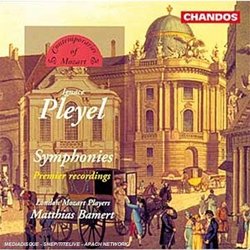| All Artists: Ignace Joseph Pleyel, Matthias Bamert, London Mozart Players Title: Pleyel: Symphony In C/Symphony In G/Symphony In D Members Wishing: 0 Total Copies: 0 Label: Chandos Release Date: 4/22/1997 Genre: Classical Styles: Historical Periods, Classical (c.1770-1830), Symphonies Number of Discs: 1 SwapaCD Credits: 1 UPC: 095115952528 |
Search - Ignace Joseph Pleyel, Matthias Bamert, London Mozart Players :: Pleyel: Symphony In C/Symphony In G/Symphony In D
 | Ignace Joseph Pleyel, Matthias Bamert, London Mozart Players Pleyel: Symphony In C/Symphony In G/Symphony In D Genre: Classical
|
Larger Image |
CD Details |
CD ReviewsIf You Love Haydn, You'll Like This Symphony in D Minor M. C. Passarella | Lawrenceville, GA | 02/27/2009 (4 out of 5 stars) "In writing of a recording of symphonies by Wilhelm Wilms elsewhere at Amazon.com, I made an invidious comparison between Wilms and Ignace Pleyel. Neither gent is in a position to protest, of course, but I think I should do greater justice to M. Pleyel. Certainly, he wouldn't be happy to learn that he's barely a musical footnote today while at the beginning of the 19th century he was Europe's most celebrated composer. This is undoubtedly a matter of coattails. Haydn had retired from orchestral composition by 1803-4, when Pleyel's Opus 66 and 68 Symphonies were written, but his body of symphonic music was the most imposing and important even then, the point of departure for all rising symphonists such as that other promising Haydn pupil, Ludwig Beethoven. It's natural that average music lovers, being about 10 or 20 years behind the times in most eras (though today about 110 or 120 years behind the times) should have cottoned to the music of Haydn's most famous student. For that matter, Pleyel himself, being a very good musician rather than a musical genius, seems to have lagged about 10 years behind his teacher. The Symphony in D minor, written in 1791 for a London concert series that competed with Haydn's first, is a fine symphony, maybe as fine as Haydn's one minor-key work among the London Symphonies (No. 95)--with a somber and stately opening, a wistful Adagio where minor and major keys play tag, and a winningly energetic rondo last movement--though it can't hold a candle to the greatest of Haydn's symphonies written for London--or Paris, if the truth be told. On the other hand, Pleyel's Opus 66 and 68, penned more than a decade later, seem untouched by the innovations of Haydn's last symphonies: experimentation with motivic and monothematic treatment that would fuel Beethoven's symphonies, with unusual time signatures and pregnant pauses for musical effect. No, Pleyel was content to produce good Haydn imitations that made few musical waves (although in Opus 68 Pleyel does boldly ditch the typical Haydn slow introduction for a plunge right into the bustling first theme). In the meantime, Beethoven was writing his Third, Fourth, and Fifth Symphonies. But often it is good to hear what cultured folks thought represented the height of artistic endeavor in their own era. It keeps us humble. And if the payoff is as generous a one as getting to know Pleyel's D Minor Symphony, by far my favorite among the offerings on the current disc, then we're even richer, I feel. The performances, on modern instruments but informed by the best practices of the authentic-instrument movement, are very fine indeed, some of the best I've heard in Chandos' Contemporaries of Mozart series. Of course some of the credit goes to Pleyel himself for inspiring such a lively performance as that of the D Minor Symphony. The recording, made in a London church, is just too resonant for this music, seeming to swell the string body unnaturally and obscure the contributions of brass and percussion. I think this isn't the sound that Haydn and Pleyel expected or wanted to hear in the "rooms" where their music was premiered. That's my only gripe. Otherwise, a worthy and well-executed endeavor by all concerned." 2nd rate masterpieces? Thomas E. Amos | Orange CA 92866 | 05/07/2010 (5 out of 5 stars) "Sounds oxymoronic, doesn't it? One reviewer said these symphs are every bit as good as Mozart and Haydn's 2cd tier works; in other words, just plain old run of the mill MASTERPIECES instead of SUPERMASTERPIECES. For connoiseurs of the High Classic Period, these wks. are "must hears" and arguments for high ranking of these works are certainly strengthened by Bamert and the Mozart Players' outstanding performances, stylistic interpretations and excellent recording. 5 stars out of five-Tom Amos, Ph.D. (music theory, UCSD}"
|

 Track Listings (12) - Disc #1
Track Listings (12) - Disc #1